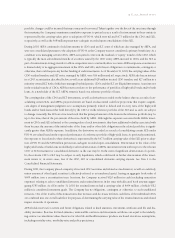American Express 2003 Annual Report Download - page 72
Download and view the complete annual report
Please find page 72 of the 2003 American Express annual report below. You can navigate through the pages in the report by either clicking on the pages listed below, or by using the keyword search tool below to find specific information within the annual report.
(p.70_axp_ financial review)
American Express Bank’s results reflect the positive impact of growth within Private Banking and its Financial Institutions
Group (FIG), partially offset by loan and other activity reductions within Corporate Banking, and within its Personal Finan-
cial Services (PFS) lending business, particularly Hong Kong.
AEB reported net income of $102 million in 2003 and $80 million in 2002, compared to a net loss of $13 million in 2001.
2001 results included restructuring charges of $96 million ($65 million after-tax). Net revenues rose 7 percent in 2003 pri-
marily due to higher commissions and fees as well as higher foreign exchange income and other revenues. Net revenues rose
15 percent in 2002, primarily due to higher net interest income and foreign exchange income and other revenue.
Net interest income in 2003 declined 3 percent compared to 2002 due to lower levels of PFS loans, reflecting AEB’s deci-
sion to temporarily curtail loan origination in Hong Kong, and declining Corporate Banking loan balances due to AEB’s exit
strategy, partially offset by lower funding costs on the investment portfolio and strong growth in Private Banking loans. Net
interest income in 2002 increased over 2001 due to the effects of lower funding costs. Commissions and fees increased
11 percent primarily due to higher volumes in FIG and Private Banking, partially offset by reduced PFS activities. In 2002,
commissions and fees increased due to growth in loan originations in the PFS business and greater non-credit transactions
in FIG, partially offset by lower results in Corporate Banking. Foreign exchange income and other revenues rose 26 percent
due to higher client activity in Private Banking and higher mark-to-market gains on FIG seed capital investments in mutual
funds. In 2002, foreign exchange income and other revenue increased primarily because of higher joint venture income,
due to lower funding costs within the premium deposits joint venture with AEFA.
Human resources expense rose 15 percent in 2003 reflecting merit increases, greater employee benefit costs, higher man-
agement incentive costs and severance costs related to AEB’s downsizing of its operations in Greece. Increases in 2003
management incentive costs included higher stock-based compensation costs from both stock options and increased levels
of restricted stock awards. The higher stock-based compensation expense from stock options reflects the Company’s deci-
sion to expense stock options beginning in 2003. Higher expense related to restricted stock awards reflects the Company’s
decision to modify compensation practices and use restricted stock awards in place of stock options for middle manage-
ment. Human resources expense decreased 4 percent in 2002 reflecting the benefits of reengineering activities.
Other operating expenses increased 14 percent in 2003 due to higher technology expenses and currency translation losses,
previously recorded in Shareholder’s Equity, resulting from AEB’s scaling back of activities in Europe, partially offset by
gains on the sale of real estate properties in Greece. Other operating expenses declined 4 percent in 2002 reflecting the ben-
efits of reengineering activities and tighter expense controls.
Provision for losses decreased 31 percent in 2003 due to lower PFS loan volumes and an improvement in bankruptcy-related
write-offs in the consumer lending portfolio in Hong Kong. Provision for losses increased substantially in 2002 primarily
due to higher bankruptcy-related write-offs in the consumer lending portfolio in Hong Kong.
























